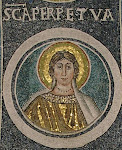One aspect of the Baptismal Covenant that I do like is the review of the words of the Apostles' Creed. In the 1928 Prayer Book, the Apostles Creed is referred to and assent to it is required, but the creed is not recited.
Minister: Dost thou believe all the Articles of the Christian Faith as contained in the Apostles' Creed?
Answer: I do.
I was surprised to see that, as I understand the linked document, at St. Gregory of Nyssa there is no creed recited at all in the regular 10:30 am Eucharist service. However, for the Baptismal service, there is a "Celebration of the baptismal creed".
Presider:
Let us rejoice with those who have committed themselves to Christ and celebrate the faith of our baptism.
All:
You O God, are supreme and holy.
You create our world and give us life.
Your purpose overarches everything we do.
You have always been with us. You are God.
You, O God, are infinitely generous, good beyond measure.
You came to us before we came to you.
You have revealed and proved
your love to us in Jesus Christ,
who lived and died and rose again.
You are with us now. You are God.
You, O God, are Holy Spirit.
You empower us to be your gospel in the world.
You reconcile and heal; you overcome death.
You are God. We worship you.
Hmmm, this is the same text referred to in Northern Michigan as "An Affirmation of Faith" from "A New Zealand Prayer Book".





3 comments:
They need to be careful about their words. I think the theology students might be have fun writing an essay on the following changes in the "Baptismal Liturgy Script."
New Text: Will you see that this child is brought up as a friend of God, sharing the faith and life of Christ?
1979 BCP: Will you be responsible for seeing that the child you present is brought up in the Christian faith and life?
Hi Underground Pewster,
I think you are right.
What is sharing the faith of Christ? I suspect the people who composed those words meant something by them and that they did not mean the Christian faith as presented in the Apostles' Creed. If they meant the Christian faith as presented in the Apostles' Creed they would have said that. And they would have used the Apostles' Creed rather than the "Affirmation of Faith".
And what is sharing the life of Christ? I am thinking that this California church has a similar theology to the diocese of Northern Michigan, since they use the same "Affirmation of Faith". So it might mean that each of us is a Christ, we are each the only begotten Son of God in whom He is well pleased.
In one of my earliest blog postings I included a link to the St. Gregory of Nyssa Episcopal Church, citing the liturgical shenanigans of that parish as one example of "reject[ing] the norms of the doctrine, discipline, and worship of the Episcopal Church for the private judgment of individual conscience."
I fully agree with the Rev. Canon Ralph McMichael, canon for ministry formation in the Diocese of Missouri, when he says:
"We are stewards of the church’s liturgy. Liturgy does not exist for our self-expression, whatever form it might take."
Besides constituting an egregious violation of ordination vows and a usurpation of the authority of General Convention, clergy who arrogate to themselves the right to compose their own liturgies for use in public worship undermine one of the most central concepts of Anglicanism: common prayer.
Besides embracing a kind of congregationalist mindset, this also weakens the witness of the Church by accommodating who we are to some of the worst aspects of an individualistic culture in which the sanctity of self-expression is simply taken for granted as more important than the responsibilities of belonging to a community that transcends one's own interests, needs, and desires.
In such a context, it makes sense to drop the Baptismal Covenant because its five questions of promise hold us accountable to normative teachings and practices that sometimes challenge the sanctity of self-expression.
Post a Comment